Healthcare Research: Sourcing, Identifying, Evaluating Evidence
VerifiedAdded on 2021/06/18
|7
|827
|37
Homework Assignment
AI Summary
This assignment solution covers the critical aspects of evidence evaluation within a healthcare context. The student explores the differences between inductive and deductive research methods, applying these concepts to specific scenarios. The assignment analyzes a qualitative study on tuberculosis treatment adherence in Thailand, identifying the research approach and its rationale. Furthermore, the solution addresses hypothesis formulation, search parameters, and the application of systematic reviews, including a detailed analysis of a systematic review on the health benefits of breastfeeding. The assignment demonstrates an understanding of research methodologies, evidence synthesis, and the ability to critically evaluate published research findings, making it a valuable resource for students studying healthcare research.
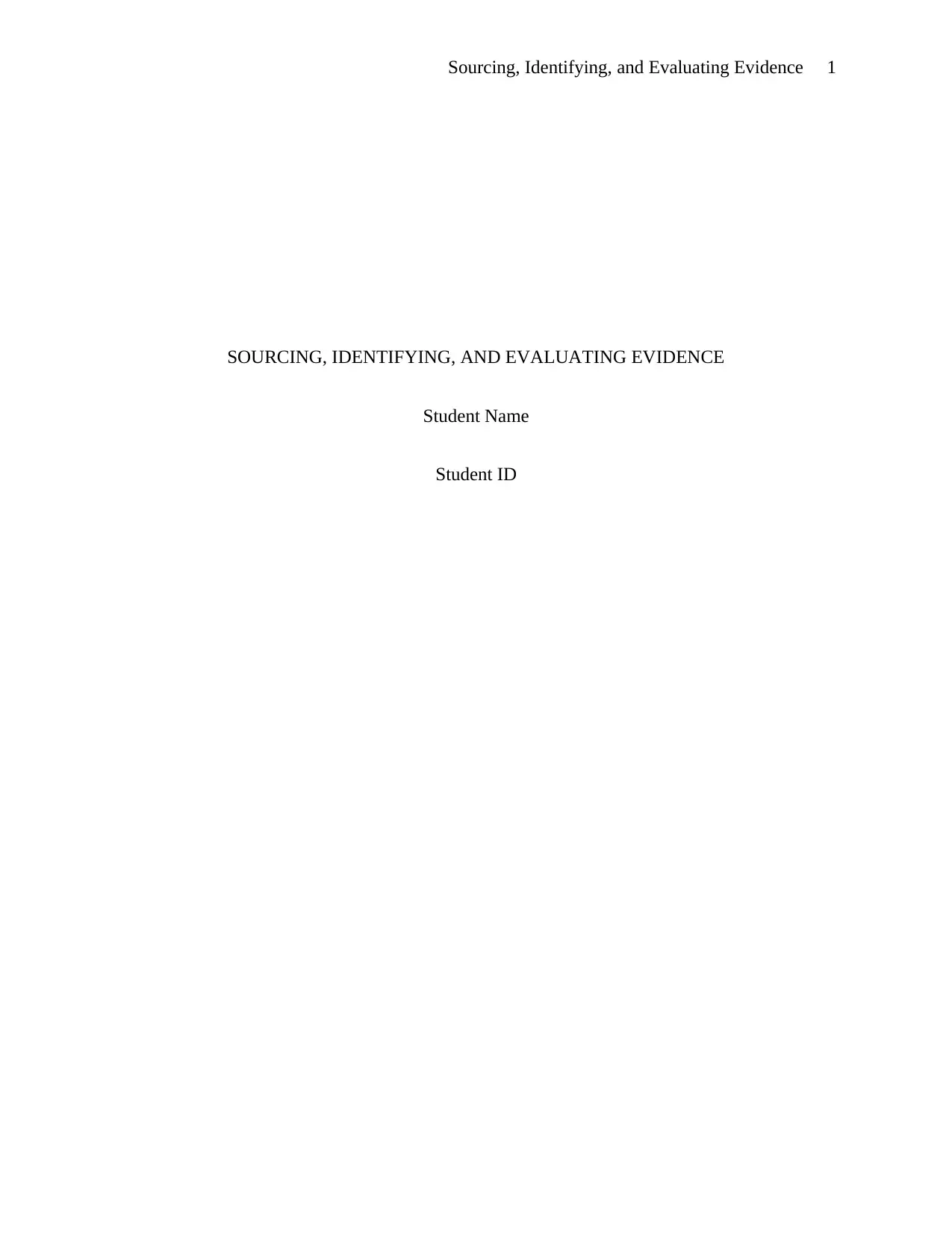
Sourcing, Identifying, and Evaluating Evidence 1
SOURCING, IDENTIFYING, AND EVALUATING EVIDENCE
Student Name
Student ID
SOURCING, IDENTIFYING, AND EVALUATING EVIDENCE
Student Name
Student ID
Paraphrase This Document
Need a fresh take? Get an instant paraphrase of this document with our AI Paraphraser
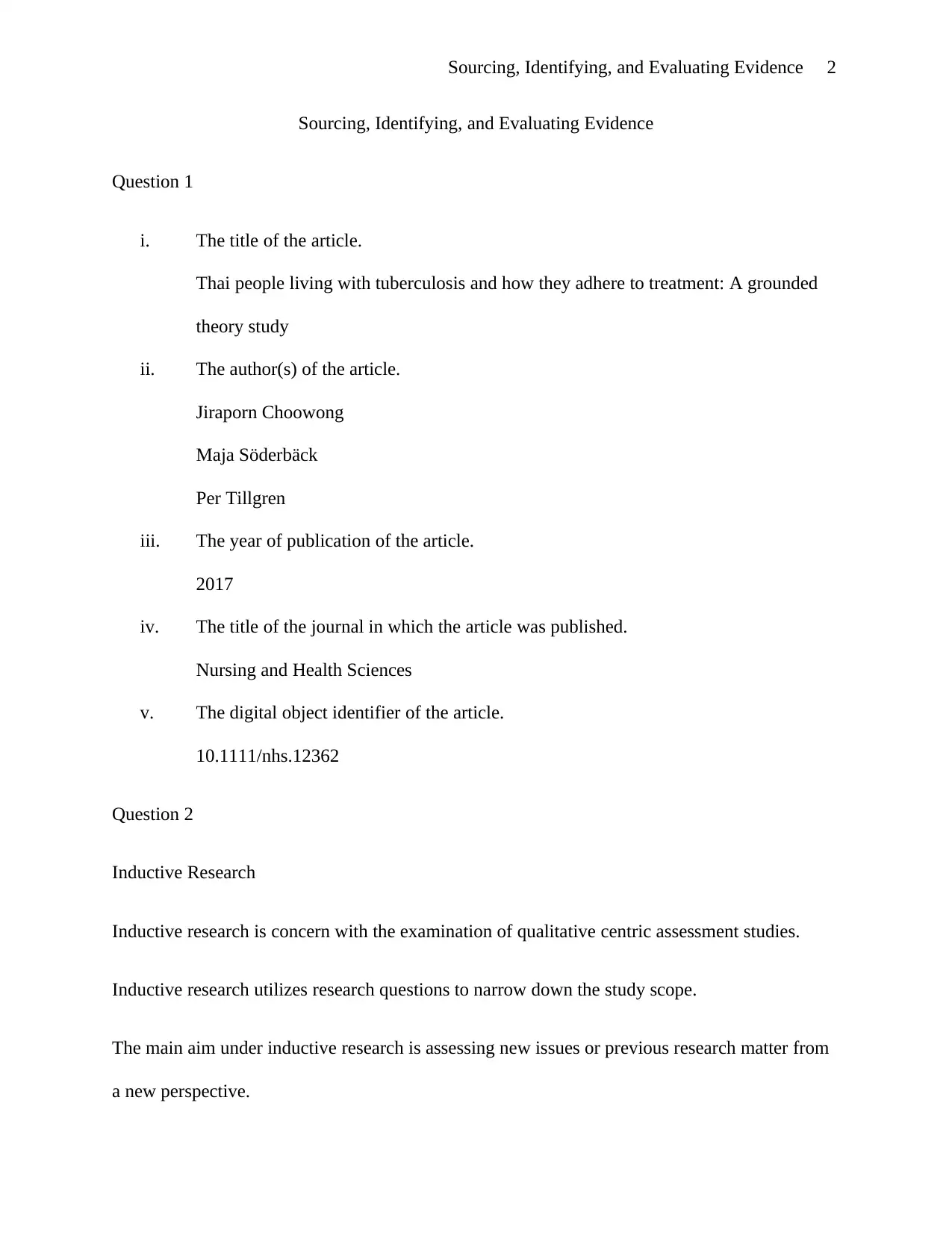
Sourcing, Identifying, and Evaluating Evidence 2
Sourcing, Identifying, and Evaluating Evidence
Question 1
i. The title of the article.
Thai people living with tuberculosis and how they adhere to treatment: A grounded
theory study
ii. The author(s) of the article.
Jiraporn Choowong
Maja Söderbäck
Per Tillgren
iii. The year of publication of the article.
2017
iv. The title of the journal in which the article was published.
Nursing and Health Sciences
v. The digital object identifier of the article.
10.1111/nhs.12362
Question 2
Inductive Research
Inductive research is concern with the examination of qualitative centric assessment studies.
Inductive research utilizes research questions to narrow down the study scope.
The main aim under inductive research is assessing new issues or previous research matter from
a new perspective.
Sourcing, Identifying, and Evaluating Evidence
Question 1
i. The title of the article.
Thai people living with tuberculosis and how they adhere to treatment: A grounded
theory study
ii. The author(s) of the article.
Jiraporn Choowong
Maja Söderbäck
Per Tillgren
iii. The year of publication of the article.
2017
iv. The title of the journal in which the article was published.
Nursing and Health Sciences
v. The digital object identifier of the article.
10.1111/nhs.12362
Question 2
Inductive Research
Inductive research is concern with the examination of qualitative centric assessment studies.
Inductive research utilizes research questions to narrow down the study scope.
The main aim under inductive research is assessing new issues or previous research matter from
a new perspective.
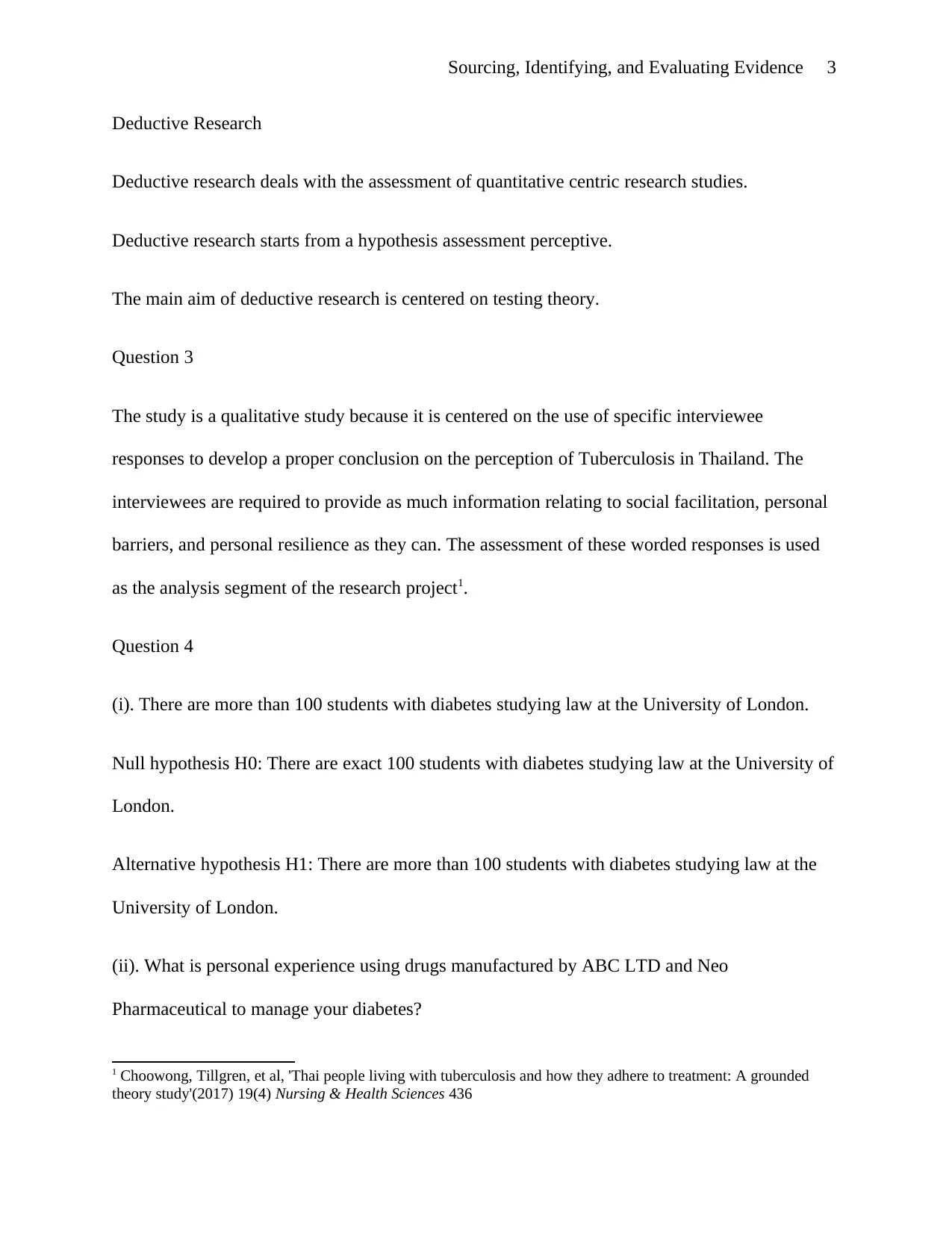
Sourcing, Identifying, and Evaluating Evidence 3
Deductive Research
Deductive research deals with the assessment of quantitative centric research studies.
Deductive research starts from a hypothesis assessment perceptive.
The main aim of deductive research is centered on testing theory.
Question 3
The study is a qualitative study because it is centered on the use of specific interviewee
responses to develop a proper conclusion on the perception of Tuberculosis in Thailand. The
interviewees are required to provide as much information relating to social facilitation, personal
barriers, and personal resilience as they can. The assessment of these worded responses is used
as the analysis segment of the research project1.
Question 4
(i). There are more than 100 students with diabetes studying law at the University of London.
Null hypothesis H0: There are exact 100 students with diabetes studying law at the University of
London.
Alternative hypothesis H1: There are more than 100 students with diabetes studying law at the
University of London.
(ii). What is personal experience using drugs manufactured by ABC LTD and Neo
Pharmaceutical to manage your diabetes?
1 Choowong, Tillgren, et al, 'Thai people living with tuberculosis and how they adhere to treatment: A grounded
theory study'(2017) 19(4) Nursing & Health Sciences 436
Deductive Research
Deductive research deals with the assessment of quantitative centric research studies.
Deductive research starts from a hypothesis assessment perceptive.
The main aim of deductive research is centered on testing theory.
Question 3
The study is a qualitative study because it is centered on the use of specific interviewee
responses to develop a proper conclusion on the perception of Tuberculosis in Thailand. The
interviewees are required to provide as much information relating to social facilitation, personal
barriers, and personal resilience as they can. The assessment of these worded responses is used
as the analysis segment of the research project1.
Question 4
(i). There are more than 100 students with diabetes studying law at the University of London.
Null hypothesis H0: There are exact 100 students with diabetes studying law at the University of
London.
Alternative hypothesis H1: There are more than 100 students with diabetes studying law at the
University of London.
(ii). What is personal experience using drugs manufactured by ABC LTD and Neo
Pharmaceutical to manage your diabetes?
1 Choowong, Tillgren, et al, 'Thai people living with tuberculosis and how they adhere to treatment: A grounded
theory study'(2017) 19(4) Nursing & Health Sciences 436
⊘ This is a preview!⊘
Do you want full access?
Subscribe today to unlock all pages.

Trusted by 1+ million students worldwide
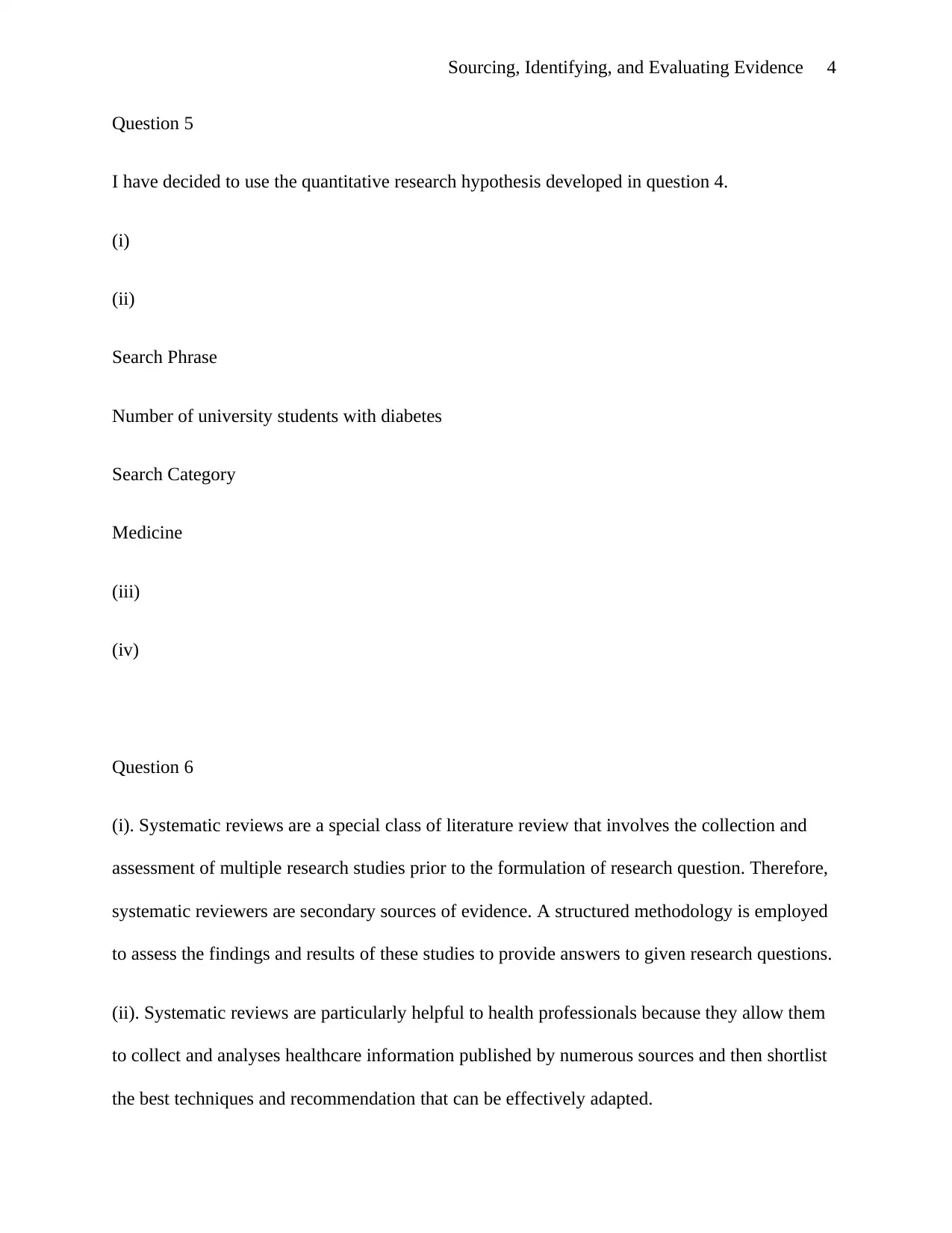
Sourcing, Identifying, and Evaluating Evidence 4
Question 5
I have decided to use the quantitative research hypothesis developed in question 4.
(i)
(ii)
Search Phrase
Number of university students with diabetes
Search Category
Medicine
(iii)
(iv)
Question 6
(i). Systematic reviews are a special class of literature review that involves the collection and
assessment of multiple research studies prior to the formulation of research question. Therefore,
systematic reviewers are secondary sources of evidence. A structured methodology is employed
to assess the findings and results of these studies to provide answers to given research questions.
(ii). Systematic reviews are particularly helpful to health professionals because they allow them
to collect and analyses healthcare information published by numerous sources and then shortlist
the best techniques and recommendation that can be effectively adapted.
Question 5
I have decided to use the quantitative research hypothesis developed in question 4.
(i)
(ii)
Search Phrase
Number of university students with diabetes
Search Category
Medicine
(iii)
(iv)
Question 6
(i). Systematic reviews are a special class of literature review that involves the collection and
assessment of multiple research studies prior to the formulation of research question. Therefore,
systematic reviewers are secondary sources of evidence. A structured methodology is employed
to assess the findings and results of these studies to provide answers to given research questions.
(ii). Systematic reviews are particularly helpful to health professionals because they allow them
to collect and analyses healthcare information published by numerous sources and then shortlist
the best techniques and recommendation that can be effectively adapted.
Paraphrase This Document
Need a fresh take? Get an instant paraphrase of this document with our AI Paraphraser
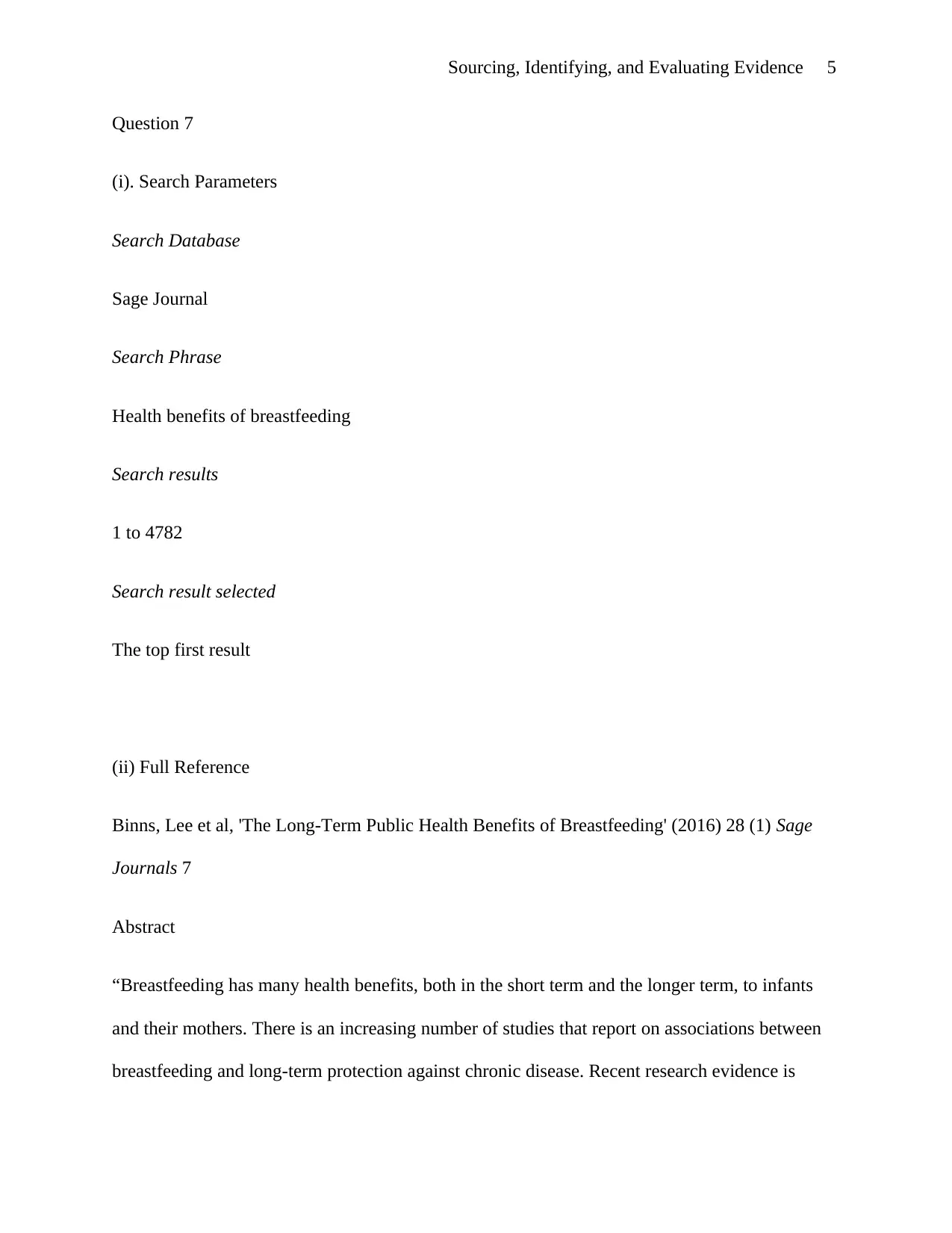
Sourcing, Identifying, and Evaluating Evidence 5
Question 7
(i). Search Parameters
Search Database
Sage Journal
Search Phrase
Health benefits of breastfeeding
Search results
1 to 4782
Search result selected
The top first result
(ii) Full Reference
Binns, Lee et al, 'The Long-Term Public Health Benefits of Breastfeeding' (2016) 28 (1) Sage
Journals 7
Abstract
“Breastfeeding has many health benefits, both in the short term and the longer term, to infants
and their mothers. There is an increasing number of studies that report on associations between
breastfeeding and long-term protection against chronic disease. Recent research evidence is
Question 7
(i). Search Parameters
Search Database
Sage Journal
Search Phrase
Health benefits of breastfeeding
Search results
1 to 4782
Search result selected
The top first result
(ii) Full Reference
Binns, Lee et al, 'The Long-Term Public Health Benefits of Breastfeeding' (2016) 28 (1) Sage
Journals 7
Abstract
“Breastfeeding has many health benefits, both in the short term and the longer term, to infants
and their mothers. There is an increasing number of studies that report on associations between
breastfeeding and long-term protection against chronic disease. Recent research evidence is
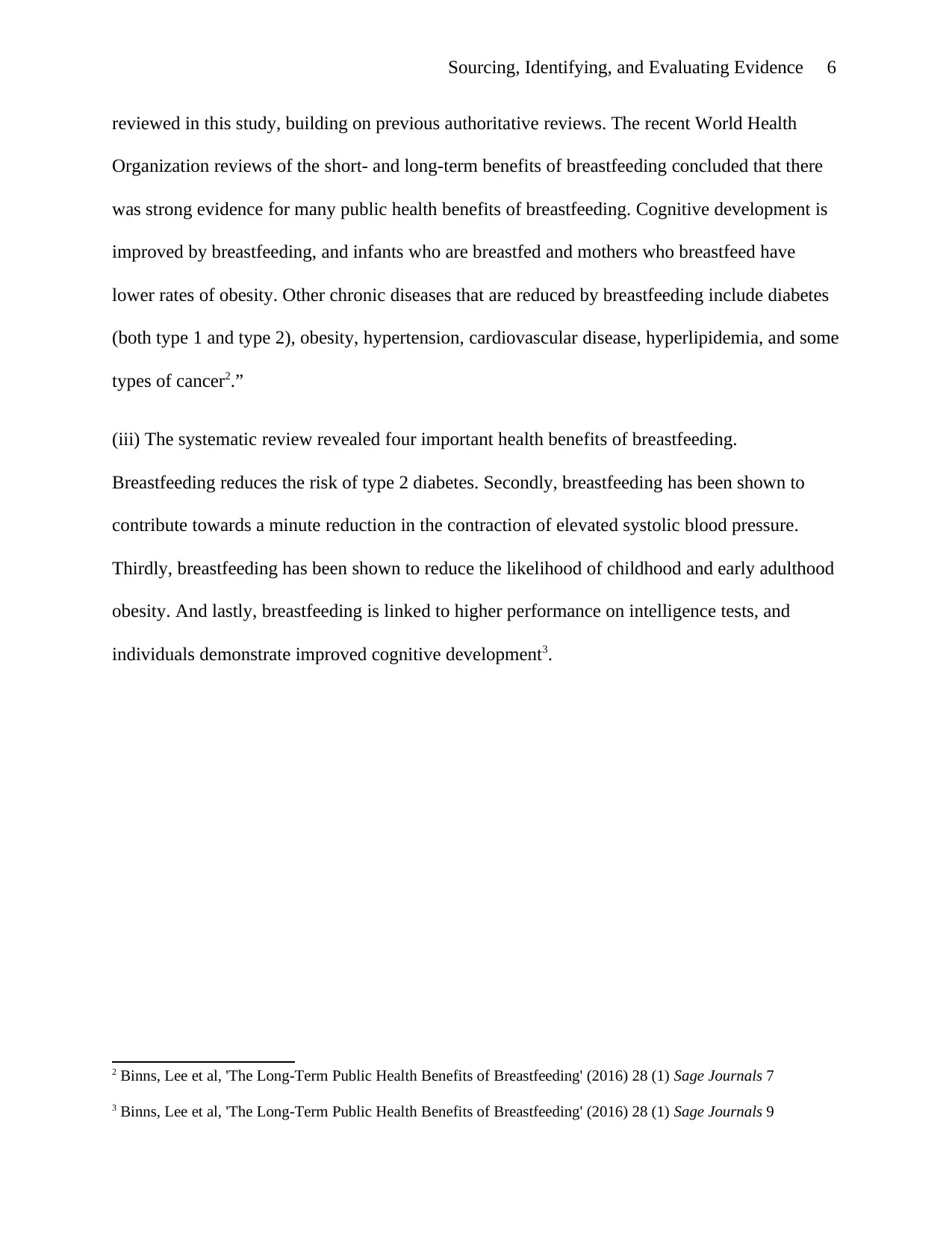
Sourcing, Identifying, and Evaluating Evidence 6
reviewed in this study, building on previous authoritative reviews. The recent World Health
Organization reviews of the short- and long-term benefits of breastfeeding concluded that there
was strong evidence for many public health benefits of breastfeeding. Cognitive development is
improved by breastfeeding, and infants who are breastfed and mothers who breastfeed have
lower rates of obesity. Other chronic diseases that are reduced by breastfeeding include diabetes
(both type 1 and type 2), obesity, hypertension, cardiovascular disease, hyperlipidemia, and some
types of cancer2.”
(iii) The systematic review revealed four important health benefits of breastfeeding.
Breastfeeding reduces the risk of type 2 diabetes. Secondly, breastfeeding has been shown to
contribute towards a minute reduction in the contraction of elevated systolic blood pressure.
Thirdly, breastfeeding has been shown to reduce the likelihood of childhood and early adulthood
obesity. And lastly, breastfeeding is linked to higher performance on intelligence tests, and
individuals demonstrate improved cognitive development3.
2 Binns, Lee et al, 'The Long-Term Public Health Benefits of Breastfeeding' (2016) 28 (1) Sage Journals 7
3 Binns, Lee et al, 'The Long-Term Public Health Benefits of Breastfeeding' (2016) 28 (1) Sage Journals 9
reviewed in this study, building on previous authoritative reviews. The recent World Health
Organization reviews of the short- and long-term benefits of breastfeeding concluded that there
was strong evidence for many public health benefits of breastfeeding. Cognitive development is
improved by breastfeeding, and infants who are breastfed and mothers who breastfeed have
lower rates of obesity. Other chronic diseases that are reduced by breastfeeding include diabetes
(both type 1 and type 2), obesity, hypertension, cardiovascular disease, hyperlipidemia, and some
types of cancer2.”
(iii) The systematic review revealed four important health benefits of breastfeeding.
Breastfeeding reduces the risk of type 2 diabetes. Secondly, breastfeeding has been shown to
contribute towards a minute reduction in the contraction of elevated systolic blood pressure.
Thirdly, breastfeeding has been shown to reduce the likelihood of childhood and early adulthood
obesity. And lastly, breastfeeding is linked to higher performance on intelligence tests, and
individuals demonstrate improved cognitive development3.
2 Binns, Lee et al, 'The Long-Term Public Health Benefits of Breastfeeding' (2016) 28 (1) Sage Journals 7
3 Binns, Lee et al, 'The Long-Term Public Health Benefits of Breastfeeding' (2016) 28 (1) Sage Journals 9
⊘ This is a preview!⊘
Do you want full access?
Subscribe today to unlock all pages.

Trusted by 1+ million students worldwide
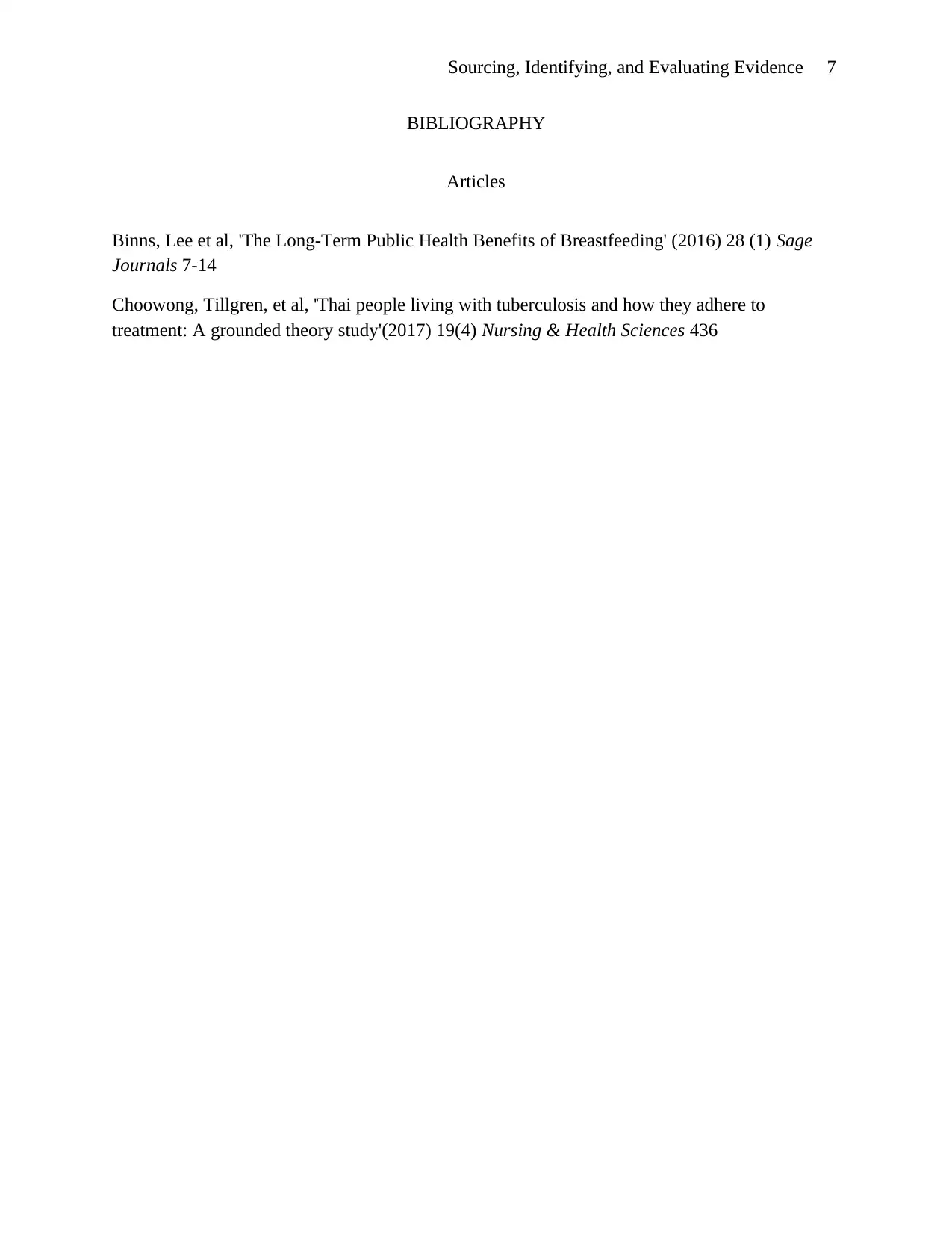
Sourcing, Identifying, and Evaluating Evidence 7
BIBLIOGRAPHY
Articles
Binns, Lee et al, 'The Long-Term Public Health Benefits of Breastfeeding' (2016) 28 (1) Sage
Journals 7-14
Choowong, Tillgren, et al, 'Thai people living with tuberculosis and how they adhere to
treatment: A grounded theory study'(2017) 19(4) Nursing & Health Sciences 436
BIBLIOGRAPHY
Articles
Binns, Lee et al, 'The Long-Term Public Health Benefits of Breastfeeding' (2016) 28 (1) Sage
Journals 7-14
Choowong, Tillgren, et al, 'Thai people living with tuberculosis and how they adhere to
treatment: A grounded theory study'(2017) 19(4) Nursing & Health Sciences 436
1 out of 7
Related Documents
Your All-in-One AI-Powered Toolkit for Academic Success.
+13062052269
info@desklib.com
Available 24*7 on WhatsApp / Email
![[object Object]](/_next/static/media/star-bottom.7253800d.svg)
Unlock your academic potential
Copyright © 2020–2026 A2Z Services. All Rights Reserved. Developed and managed by ZUCOL.




